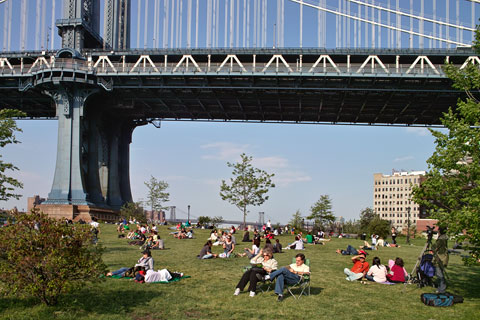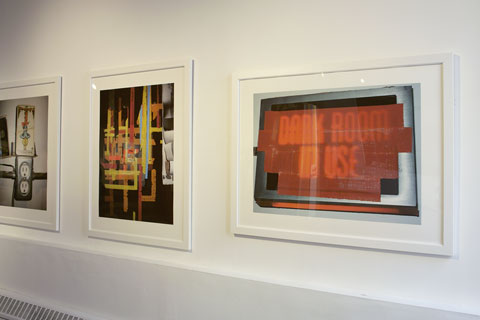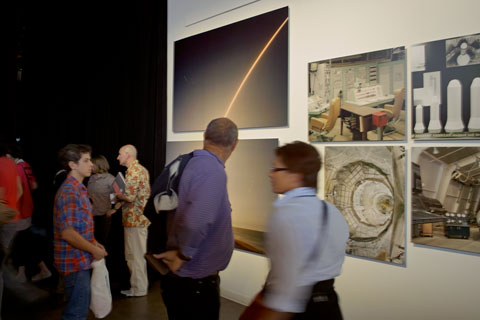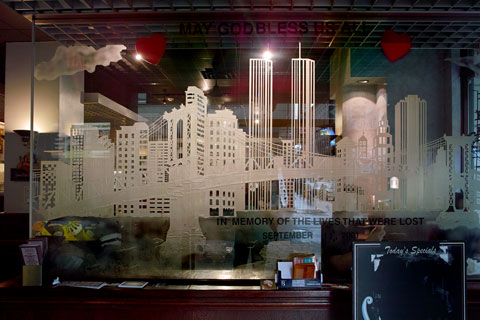
Under the Manhattan Bridge (digital)
First of all, a large international festival in New York dedicated to contemporary photography is a great idea. Second of all, locating it in Dumbo, the atmospheric neighborhood of warehouse and factory buildings beneath the Manhattan and Brooklyn Bridges is brilliant.
A few years ago, powerHouse Books, the photo book publisher moved to Dumbo from cramped quarters in Manhattan and created a spacious book store/gallery called the powerHouse Arena. Likewise, VII Photo Agency, representing photojournalists James Nachtwey and Lauren Greenfield, among others, located its NYC offices with accompanying book store and gallery in Dumbo. Combine these companies with the visionary real estate firm Two Trees, and the necessary synergy was in place to make an event like this possible.
The festival was not, thankfully, another showcase of commercial galleries. Nor was it a “Whitney Biennial, ” which has become so tiresome as a vehicle for curatorial excess that I go out of my way to avoid it. Four curators–you can’t live without ’em–each put together thematic shows aimed at suggesting where contemporary photography is heading.
Well, actually, I didn’t go for Tim Barber’s more-the-merrier show of dozens of images all the same size, all the same weight, mix and match, stream of consciousness, grab bag of goodies, random musings, serendipitous connections, or as Barber puts it, an exquisite corpse. Give me more less is more, please.

Natalie Czech photo (digital)
I liked Lesley Martin’s “Ubiquitous Image” even though, theoretically, I’m supposed to be a straight photography kind of person. Maybe it was the exhibition space, which was better lit and better organized than the others, or maybe it was the work itself. It was all art about photography, or making use of photography, or found photography, rather than photography, but I found much of it interesting, occasionally beautiful, and generally coherent. Natalie Czech’s big Photoshop collages were particularly nice. Similarly, I liked the shredded strips of images by Joachim Schmid, non photographs comprised entirely of photographic images.

Michel Campeau photos (digital)
Martin’s Parr’s “New Typologies” should have interested me more, but I guess I’m a little burned out on the idea of typologies. Although there is a long photographic tradition behind this kind of work–think Blossveldt, Saunders, the Bechers, et al–I found myself wanting Parr’s selected photographers to be less bloody systematic and more spontaneous. That said, I really liked Michel Campeau’s beautiful/ugly images of stuff in traditional photographic darkrooms. Did we really work in places like this once? I wanted to like Jan Kempenaer’s documentations of Soviet era monuments, but couldn’t get past the Becher-induced trance. I like the Bechers, by the way. And if that’s the way he wants to work, I wanted view camera detail rather than the slightly soft graininess of medium format. I enjoyed Sarah Pickering’s pictures of explosions. Boom.

Simon Norfolk photos (digital)
Finally, Kathy Ryan’s exhibit was harder for me to grasp thematically, and it was the most difficult space–St. Ann’s Warehouse–to look at work. There were lectures and panel discussions going on in the theater located at the center of the space. I liked the two programs I went to, but the bustle of people coming and going didn’t help the exhibition. Andreas Gefeller’s large, probably beautiful prints were hurt the most because they were basically unlit. Although I am not opposed to Ryan’s notion that many photographers take their cues from the other visual arts, I don’t know if I really want to think this way when comparing Simon Norfolk’s images of rocket installations and Horacio Salinas’s images of discarded tires. Or Katherin Wolkoff’s deer nests and Stephen Gill’s crumpled paper. I couldn’t follow, or didn’t want to follow, the curator’s thread through such disparate work. By the way, of all the work in the festival, I am probably most naturally attracted to Simon Norfolk’s images of war torn landscapes. I’ll look for a chance to write about him in the future.

Pizza restaurant in Dumbo (digital)
The over all theme of the festival was the future of photography. Given the extreme diversity of contemporary photography–from straight to staged, composed to found, reused to deauthorized–the future, as seen in this festival, remains uncertain, leading off in different directions. But certainly, photography is not, as some have asserted, a medium in decline.
